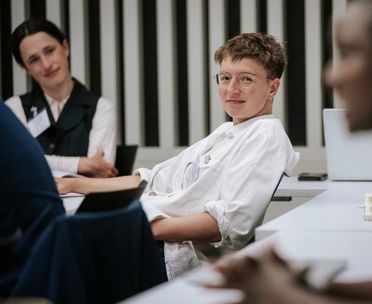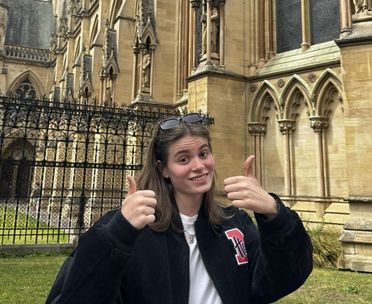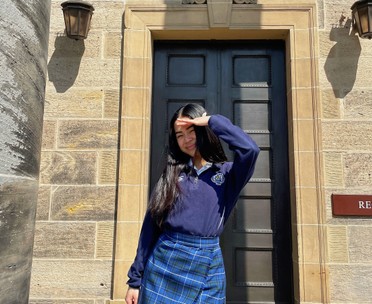

Vogue Leaders Interview with Elita de Klerk
May 23, 2023
The June issue of Vogue Leaders magazine published the interview with the former First Lady of South Africa. Elita de Klerk has continued to be involved in human rights, particularly through the FW de Klerk Foundation, after the death of her husband. Michaela and Zdeněk Bakala have also long supported the activities of this foundation. We are therefore pleased to publish the interview with Elita on her life love, education, human rights and philanthropy on our website.
Love not only took her far from her original home but also into a role that made her part of the historical events that shaped the modern face of South Africa. It became her destiny and her new home. Today she is dedicated to charity work and sharing the legacy of her husband, a former president of a country that has more in common with ours than we think.
Who is asking
MICHAELA DOMBROVSKÁ
Head of the Department of Library Science at the Silesian University in Opava, where she deals with, among other things, information policies and digital literacy. She has been working in journalism for more than ten years and is the author of She is the author or co-author of a number of professional and popularization books, the latest of which, entitled Information Detox, was published by Grada in 2021. Since 2018 she has been collaborating with with Vogue CS, especially but not only on the Vogue Leaders project.
Who is answering
ELITA DE KLERK
She was the wife of the recently deceased President of South Africa, Frederik Willem de Klerk. Together with him, she stood at historic milestones, notably the abolition of apartheid and the release of Nelson Mandela from prison. Today, she is committed to preserving the legacy of a statesman who was at the heart of the new constitution, who was always committed to the protection of human rights and who won the Nobel Peace Prize. She is active in several foundations and projects that promote education, and focuses on the protection of disadvantaged and abused children. She is also an amateur painter and patron of the Cape Town Philharmonic Orchestra.A year and a half after the death of the former President of South Africa, Elita de Klerk is not only involved in charitable activities aimed at disadvantaged and abused children, of whom there are far too many in a country that is still struggling with the consequences of racial segregation but also as deputy chair of the Board of Trustees of the FW de Klerk Foundation, which she and her husband founded twenty-four years ago. In addition, she is interested in art and literature, supports opera, and is herself an amateur painter. The resemblance to Dagmar Havel, wife of the first Czech President and former first lady of the Czech Republic, is not accidental. The two families have maintained close friendships and met not only in Prague, where the de Klerks have repeatedly attended the Forum 2000 conference. They also became close friends of Michaela and Zdenek Bakala, who found another home near Cape Town and have become regular supporters of FW de Klerk's legacy through their philanthropic activities.
There are more fragile lines connecting two culturally and historically quite different countries on opposite sides of the world. For a person who has traveled this far southwards and to the African continent for the first time, it can surprise and lead one to reflect on what we take for granted in our country. Our conversation takes place in Cape Town, the authentic backdrop of the life story of a woman who followed the voice of her heart and eventually found a home in South Africa.
Both countries have embarked on the path of finding their own identity relatively recently; while the communist regime fell in 1989, apartheid ended in South Africa in 1994. Both countries are also undergoing another major change right now. While the Czech Republic already has a new president, Peter Paul, and is hoping for a return of dignity in the highest constitutional role, South Africa faces elections early next year, which promise to change course and correct a corrupt national administration.
But there are also differences. Divergences that are surprising but typical of an African country. Inflation rates and unemployment rates of up to 30% are incomparable to our latitudes. We're having this conversation as a joint military exercise between South Africa, China, and the Russian Federation takes place near Durban on the east coast a year after the invasion of Ukraine. Yet when the International Criminal Court in The Hague issued an arrest warrant for Russian President Vladimir Putin in March, South Africa was among the countries that recognized the tribunal's decision and has not changed its position. If you go to South Africa, you can discover tourist areas with a high level of service but also places where you will rightly fear for your bare life.
Moreover, the whole country is dealing with massive power cuts and looming civil unrest. A look at the excluded areas and the people who languish in them might lead you to reflect and be grateful for what is far from commonplace for much of the world.
Nevertheless, Elita de Klerk is not indifferent to the fate of this land rich in natural beauty. Although she now spends time with her family partly in Europe, she still returns to Cape Town and strives to help ensure that the values and, above all, the protection of human rights, so cherished and protected by her husband, continue to endure.

How did you, a European girl, get to South Africa?
I was born in Greece and lived in the UK with my first husband, also Greek. It was actually he who had links to South Africa, and it was with him that I first visited the country. But we spent most of our time in London. It was there that I met FW. Today, I would say that I have always had Africa in me. Nothing is a complete coincidence. One event leads to another, and together they create destiny. South Africa became my destiny.
What does Europe have in common with South Africa? Are there any similarities?
For example, when I think about my Greek roots and how superstitious we are in Greece, I immediately think that we all believe in good and evil spirits. And also, family and friends are very important to us. That's why I still feel at home in Cape Town. I have many close friends here. I've tuned into the local mentality. We may have different problems in Europe and Africa, but we are human beings everywhere. Family and friends are what make a home, regardless of the continent.
You are known for your support of local culture, especially opera and literary societies. The arts are one of your great passions. How do you balance your time between your interests and community service?
I got married at 18 and never went to university. So I had a great need to at least educate myself. I read a lot of books, took various courses.
Alongside my husband, as the wife of the President, I had a lot of responsibilities and was very visible. I accepted it because it was my role to support him. But it wasn't easy to find the right position, not to be seen too much, but not too little either. I was looking for a way and making mistakes. I supported my husband, and he supported me. We were a team. But I felt I needed something of my own. I found the answer in art.
Is this also why you support young people's education today through various foundations?
Yes, I consider it very important. They need to know history in order to be able to cope with it. And they need to know their rights so that they can enjoy them and demand them. And also their responsibilities so that they can contribute to the development of the country. We need a healthy and educated opposition. At the FW de Klerk Foundation, we focus on education on constitutional rights. In South Africa, democracy is still very young. It is elected on the basis of popularity, not on the basis of an agenda. We have a major election next year, and I am afraid that we must not waste this opportunity.

Your public activities have not stopped; on the contrary. For example, you support the Global Leadership Foundation, which your husband also co-founded. What does it do?
World leaders in various positions should teach their successors. This Foundation is a platform where they can meet, share experiences, and pass them on to young talent. It's actually similar to your Forum 2000 Foundation. It is something that we share. Both foundations promote democratic values and share them. My husband and I used to go to the Forum 2000 conference a lot. I remember Prague very fondly; I can't count the number of times I've been there. Thanks to your President, I also met His Holiness, the Dalai Lama, and it left a deep impression on me.
What do you think defines good leadership?
Great leadership needs small egos. And it's also a good plan and the ability to make critical decisions at the right time. I would like to see more women in leadership because they have more integrity and honor. Do you know that in South Africa, we have about 60 ministers, including deputy ministers, in the government? But that would go back to how disillusioned I am with current politics.
So how do you see the direction the country is heading? Right here, for example, there is a joint exercise with Russia.
There is a saying in Greece: you cannot see under the hood. So, we don't know what's cooking. Something's going on, but you don't read about it anywhere. When my husband was President, and Nelson Mandela after him, we were worried about Russian influence. We joined the UN. South Africa dismantled its nuclear weapons in 1990, soon after FW became President in 1989. I still remember that. And you see where we are now.
How did you meet your husband?
In a business meeting about investments in South Africa. We both had our connections, and we were friends. All for the wrong reasons, as they say. My then-husband for business and my later husband for me. When FW and I met, it was like soul mates. Yet, for many years we hid our feelings. We were completely separated for a few years, but it was too painful. We couldn't forget each other. When we met again in 1993, we decided to act despite the fact that FW was already President at the time. It was difficult, but we never regretted it.

How was your husband in private?
He had a sense of humor. He was modest, personable, and very spontaneous. He put his family first. Actually, he had a bit of a Greek personality. He was a wonderful man. His children are carrying on his legacy today. When he became a grandfather through my children, he really enjoyed it. I miss him very much. I have better days and worse days, but on each of those days, I feel a great loss. Work helps me. At the FW de Klerk Foundation, we're in the process of establishing a Centre for the Constitutional Transformation of South Africa to provide an audio-visual and internet presentation on South Africa's constitutional transformation and to highlight the key importance to all South Africans of the 1996 Constitution. The new constitution, which my husband was involved in, was adopted in 1996; it is still very young, just like yours.
You and your husband were really very close. What keeps you going?
Depends on when and how. I don't say it much, but I have anxiety. I think a long life is fine when you are healthy, including mental health. So I try to take care of myself. My children and grandchildren help me. One topic that interests me a lot is sustainability, conservation. That's a big topic in Africa. I give talks on biodiversity and climate protection. If I am useful, I have a reason to continue.
What about sustainable fashion brands?
Fashion is a way for me to express myself without words. I like to dress nice. I support local brands because part of sustainability is also supporting crafts. And traditional African crafts have a long tradition. I also like jewelry, but it has a bloody history, especially here. So I'm very selective in that regard as well. Not to mention it's not safe to wear too much statement jewelry here.
Is the high crime rate related to the economic situation?
I think it's not only that; it's partly the mentality. It's the feeling of freedom from living on the streets and without rules. There's also a lot of high unemployment, which drives other people out on the street who would like to make an honest living. But they don't have the opportunity. Hopefully, that will change soon too. Everything that happens in the world today is connected. The war in Ukraine, the natural disasters in Turkey and Syria, everything has consequences, even in a country as far away as South Africa. That is why education and sharing are so important. So that we can understand and help each other. And to focus on what's really important.
And what is really important in Africa?
South Africa has rich and wonderful natural resources. You'll find amazing corners of nature. Two oceans meet at the southern tip of the continent; we have high mountains, but also deserts. There are many challenges that we can explore and contribute to solving the climate crisis. And there is much that needs to be done to make the people of the country live well. Good education is the first step. But that is true everywhere, in every country. Education is the path to understanding.
#humanrights #education #philanthropy

We were introduced to the de Klerks by Václav Havel in 2010, during his last trip abroad. We were close in our values, attitudes, and views on the current problems of the world. The parallel with our history in the period of systemic changes after 1989 is also very strong. South Africa today, like many other countries, is torn by contradictions, has also gone through a pandemic, and is struggling with corruption, migration, and many other problems. At the same time, it is a beautiful and large country with vast mineral wealth, a multicultural population, and a modern constitution that FW de Klerk and Nelson Mandela championed.
No country in this world is an ideal place, but it is important to have ideals and not be afraid to uphold them. We are among the supporters of the FW de Klerk Foundation, established with the goal of furthering democracy, freedom, and human rights in South Africa. We have supported the creation of a new center where a permanent exhibition tracing South Africa's transformation from apartheid to the emergence of constitutional democracy between 1989 and 1994 will be available for the younger generation. The project also includes the creation of an archive and a venue for events commemorating key events. The Foundation promotes unity in diversity, supports charities that care for disabled and disadvantaged children, and promotes the legacy of the peaceful presidencies of FW de Klerk and Nelson Mandela. We appreciate the opportunity to be there.
Michaela and Zdenek Bakala


